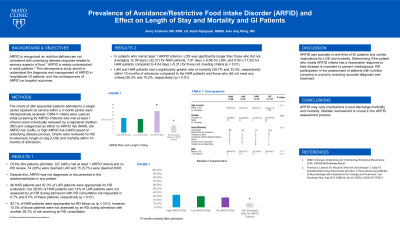Monday Poster Session
Category: Functional Bowel Disease
P1955 - Prevalence of Avoidant/Restrictive Food Intake Disorder (ARFID) and Effect on Length of Stay and Mortality in GI Patients
Monday, October 23, 2023
10:30 AM - 4:15 PM PT
Location: Exhibit Hall

Has Audio
- AE
Avery E. Erickson, MS, RD
Mayo Clinic
Rochester, MN
Presenting Author(s)
Avery E. Erickson, MS, RD, Anjali Rajagopal, MBBS, Xiao Jing Wang, MD
Mayo Clinic, Rochester, MN
Introduction: Avoidant/Restrictive Food Intake Disorder (ARFID) is diagnosed as nutrition deficiencies not consistent with underlying disease response and is under recognized in the adult population. We aimed to understand the diagnosis and management of ARFID in hospitalized GI patients, and the consequences of ARFID on hospital outcomes.
Methods: The charts of 264 sequential patients admitted to a single center inpatient GI service within a 3-month period were retrospectively reviewed. ARFID DSM-V criteria were as initial screening for ARFID. Patients who met at least 1 criterion were individually reviewed by a registered dietitian (RD) and categorized as either no ARFID risk (NAR), low ARFID risk (LAR), or high ARFID risk (HAR) based on underlying disease process. Charts were reviewed for RD involvement, length of stay (LOS) and mortality within 10 months of admission.
Results: Of the 264 patients admitted, 127 (48%) met at least 1 ARFID criteria and on RD review, 74 (28%) were deemed LAR and 15 (5.7%) were deemed HAR. Despite this, ARFID was not diagnosed or documented in the assessment/plan in any patient. All HAR patients and 97.3% of LAR patients were appropriate for RD evaluation, but 26.6% of HAR patients and 13% of LAR patients were not assessed by an RD during admission with RD consultation not requested in 6.7% and 9.5% of these patients, respectively (p < 0.01). 92.1% of NAR patients were appropriate for RD follow up (p < 0.01); however, 10.5% of those patients were not assessed by an RD during admission with another 26.3% of not receiving an RD consultation. In patients who met at least 1 ARFID criteria, LOS was significantly longer than those who did not, averaging 12.39 days (±22.27) for NAR patients, 7.81 days (±9.08) for LAR, and 8.40 (±11.02) for HAR patients compared to 4.04 days (±5.31) for those not meeting criteria (p < 0.01). LAR and HAR patients had a significantly greater rate of mortality (29.7% and 33.3%, respectively) within 10 months of admission compared to the NAR patients and those who did not meet any criteria (26.3% and 10.2%, respectively) (p < 0.01).
Discussion: ARFID was possible in one-third of inpatient GI patients and carries implications for LOS and mortality. Determining if the patient who meets ARFID criteria has a reasonable response to their disease is important to prevent misdiagnosis. RD participation in the assessment of patients with nutrition concerns is crucial to ensuring accurate diagnosis and treatment.
Disclosures:
Avery E. Erickson, MS, RD, Anjali Rajagopal, MBBS, Xiao Jing Wang, MD. P1955 - Prevalence of Avoidant/Restrictive Food Intake Disorder (ARFID) and Effect on Length of Stay and Mortality in GI Patients, ACG 2023 Annual Scientific Meeting Abstracts. Vancouver, BC, Canada: American College of Gastroenterology.
Mayo Clinic, Rochester, MN
Introduction: Avoidant/Restrictive Food Intake Disorder (ARFID) is diagnosed as nutrition deficiencies not consistent with underlying disease response and is under recognized in the adult population. We aimed to understand the diagnosis and management of ARFID in hospitalized GI patients, and the consequences of ARFID on hospital outcomes.
Methods: The charts of 264 sequential patients admitted to a single center inpatient GI service within a 3-month period were retrospectively reviewed. ARFID DSM-V criteria were as initial screening for ARFID. Patients who met at least 1 criterion were individually reviewed by a registered dietitian (RD) and categorized as either no ARFID risk (NAR), low ARFID risk (LAR), or high ARFID risk (HAR) based on underlying disease process. Charts were reviewed for RD involvement, length of stay (LOS) and mortality within 10 months of admission.
Results: Of the 264 patients admitted, 127 (48%) met at least 1 ARFID criteria and on RD review, 74 (28%) were deemed LAR and 15 (5.7%) were deemed HAR. Despite this, ARFID was not diagnosed or documented in the assessment/plan in any patient. All HAR patients and 97.3% of LAR patients were appropriate for RD evaluation, but 26.6% of HAR patients and 13% of LAR patients were not assessed by an RD during admission with RD consultation not requested in 6.7% and 9.5% of these patients, respectively (p < 0.01). 92.1% of NAR patients were appropriate for RD follow up (p < 0.01); however, 10.5% of those patients were not assessed by an RD during admission with another 26.3% of not receiving an RD consultation. In patients who met at least 1 ARFID criteria, LOS was significantly longer than those who did not, averaging 12.39 days (±22.27) for NAR patients, 7.81 days (±9.08) for LAR, and 8.40 (±11.02) for HAR patients compared to 4.04 days (±5.31) for those not meeting criteria (p < 0.01). LAR and HAR patients had a significantly greater rate of mortality (29.7% and 33.3%, respectively) within 10 months of admission compared to the NAR patients and those who did not meet any criteria (26.3% and 10.2%, respectively) (p < 0.01).
Discussion: ARFID was possible in one-third of inpatient GI patients and carries implications for LOS and mortality. Determining if the patient who meets ARFID criteria has a reasonable response to their disease is important to prevent misdiagnosis. RD participation in the assessment of patients with nutrition concerns is crucial to ensuring accurate diagnosis and treatment.
Disclosures:
Avery Erickson indicated no relevant financial relationships.
Anjali Rajagopal indicated no relevant financial relationships.
Xiao Jing Wang indicated no relevant financial relationships.
Avery E. Erickson, MS, RD, Anjali Rajagopal, MBBS, Xiao Jing Wang, MD. P1955 - Prevalence of Avoidant/Restrictive Food Intake Disorder (ARFID) and Effect on Length of Stay and Mortality in GI Patients, ACG 2023 Annual Scientific Meeting Abstracts. Vancouver, BC, Canada: American College of Gastroenterology.
